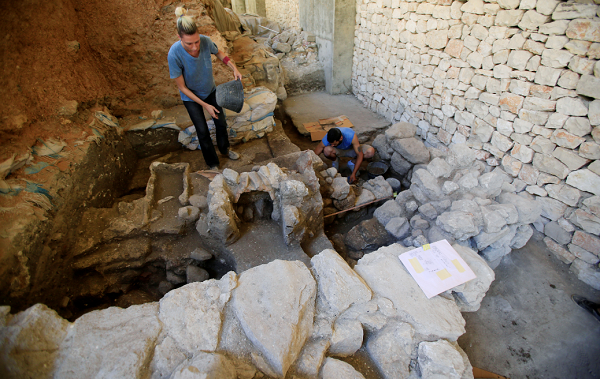Archaeology Proves The Bible Is A True Story? King Solomon Era Palace Found In Israel

A group of American archaeologists claim they have discovered a palatial building dating all the way back to the King Solomon era in Israel.
The monumental building was built over 3,000 years ago during the 10th century BCE in the royal city of Gezer, Israel’s Haaretz reported Wednesday. Although archaeologists haven’t found any evidence of which Israelite king lived there – if any – the excavators predict the building was created during King Solomon’s reign after finding Philistine pottery that coincided with biblical accounts of Philistinians living in Gezer until the city was vanquished by King David, Solomon's father.
The compound featured a large central courtyard similar to contemporary palace-like buildings throughout the southern Levant in areas like Hatzor and Megiddo. The complex was also built with ashlar masonry – large rectangular-shaped monolithic hewn stones – that are not commonly found in domestic structures of the same capacity in modern day Israel, according to Steve Ortiz of the Tandy Museum of the Southwester Bastist Theological Seminary of Fort Worth, Texas, who worked with the archaeological team who found the site and described the findings to Haaretz.
Although archaeologist are unsure if Solomon ever visited the site, they named the compound “Solomon’s Palace” because of his biblical tradition of building grand projects at Hatzor, Megiddo and Gezer. There is also a passage in the Bible (1 Kings 9: 16-17) that says Egypt’s monarch gave the city of Gezer to Solomon as a dowry for his wife, after which Solomon rebuilt the city.
In the Bible, the city of Gezer was first associated with the Philistines during David’s time when the king broke their power “from Geba to as far as Gezer,” (2 Samuel 5:25; 1 Chronicles 14:16). According to archeologists, their latest discovery – in which they also found Philistine bichrome pottery and figurines of Aegan goddesses that have been discovered in other excavations associated with Philistinian culture – only further proved the Philistine link to the palace.
© Copyright IBTimes 2024. All rights reserved.






















